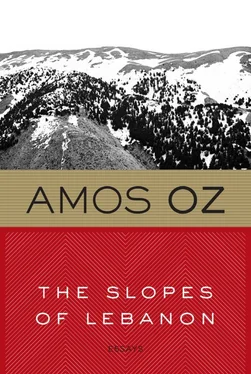But who are “the people” in this case? We cannot simply place the spilled blood at the doorstep of the ecstatic masses who shouted “Begin! Begin!” Many of them celebrated the war and spat their hatred in every direction, but they weren’t the ones who had started it and they weren’t the ones who allowed it to go on. The Labor party and the centrist Shinui party (Democratic Party for Change), and some of the members of the dovish left wing of the Knesset, either voted with the government or abstained in the vote of no confidence when the war broke out. M. K. Imri Ron, of the left-wing Mapam, was photographed in his army uniform and his officer’s insignia, calling upon his party to support the war and not to incense the people. Labor’s Motta Gur volunteered to serve as Sharon’s unofficial adviser. And Labor party leader Yitzhak Rabin recommended “tightening the siege on Beirut.” Thus spoke the representatives of enlightened Israel, the land of the pioneer folk songs. And even Ma’ariv, the afternoon newspaper, published a political cartoon, portraying the Israeli army, tiny but unyielding, standing all alone against a ferocious, hairy terrorist giant, armed to the teeth, while a knife held by Peace Now is being plunged in the back of the brave little IDF.
In Tel Aviv and the development towns, at kibbutzim, just as in Juniyeh, the Christian suburb of Beirut, the dead died and the bathers bathed in the sea, businessmen transacted business and vacationers took package trips to Scandinavia — returning, of course, in time for the opening of school for their children. No one heard, or could have heard, the wail of an air-raid siren. No one (except the Israeli residents along the northern border during the first two nights) hurried into bomb shelters. The newspapers were filled with Lebanese cherries, with obituaries, Beirut restaurant reviews, nightclub features in the Christian enclave, and shouts of merrymaking. There were endless television broadcasts of joyous Lebanese civilians showering the rice of welcome on Israeli military convoys and just a handful of left-wing pictures of burning cities, maimed children, and weeping women. (“They’re used to that sort of thing over there,” several newspapers wrote. “Why, up there in Lebanon, slaughter is a way of life.”)
And the radio dipped it all in the oil of idyllic nostalgia while Begin and his friends presented the ongoing horror as a sort of neurotic mixture of a new Eichmann trial (with Arafat, if and when he was caught, in the lead role), the Sinai campaign in an expanded edition (with Israel in the role of scourge for the Western world), together with the fall of Nazi Berlin (with Arafat’s bunker cast as the bunker of Adolf Hitler), and “The Six-Day War Rides Again” (down to the “poetic” touch of identical dates), topped off by “healing the trauma of the Yom Kippur War” (in the words of the Great Traumatizer).
Right up until the BBC reported the slaughter that the Phalangists had conducted by the light of our flares in Shatilla and Sabra. Until Emil Grunzweig was murdered by a hand grenade intended for all the opponents of this war. That grenade closed a circle: Jerusalem had gone off to clean up Beirut and now Beirut had reached the heart of Jerusalem to turn Jerusalem into a Beirut.
Not one popular song was born out of the Lebanon War, except “Planes come down from up anon / Taking us to Lebanon / For Sharon, O, we will fight / And come home in coffins tight,” which was composed by defeatist soldiers, plunging their knives into their own backs. Perhaps it would have been proper to set to music the poems of despair, anger, and loss written during those days by Israel’s poets, young and old, or the elegies written by Raya Harnik for her son Goni, the Peace Now activist, who had died at Beaufort, and then to play them on the Hebrew hit parades. But no, the metabolism of the idyllic Hebrew melodies would not have been able to absorb them. So they would have no place even among such elegies to heroes of past wars as “A Palmachnik Named Dudu,” “In the Plains of the Negev a Defender Fell,” “Accept, Ye Hill of Ephraim, This New Young Sacrifice.”
There would be no more songs about “The Bitter and the Sweet,” only about the bitter and the hasty.
Seven years have passed since then. I have tried to replace my alienation of those days with various kinds of involvement, engagements, petitions, and public stands. This collection of essays deals with these issues.
There are times when I forget a little, when I try to persuade myself that the “people” learned a lesson, that they have learned — the hard way — the limits of power, that there’s a catch in a philosophy based on violence. There are times when I think that “it” can’t happen again.
Perhaps.
But among the victims of the Lebanon War was “the Land of Israel, small and brave, determined and righteous.” It died in Lebanon perhaps precisely because, in Lebanon, its back was not to the wall. It was the wall and they, the Palestinians in Lebanon, had their backs pressed to the wall. From underneath the “ponytail and pinafore” of the myths, the claws peeked out. Just as they continue to peek out daily: not only in the occupied territories, but also in the “good Israel of old”—in the suburbs and in the cities, on the crazy peripheries as well as in the enlightened, sane center, in the slums and on the campuses, among the hotheads and among the intelligentsia, and in the heart of the corridors of power.
After Lebanon, we can no longer ignore the monster, even when it is dormant, or half asleep, or when it peers out from behind the lunatic fringe. After Lebanon, we must not pretend that the monster dwells only in the offices of Meir Kahane; or only on General Sharon’s ranch, or only in Raful’s carpentry shop, or only in the Jewish settlements in the West Bank. It dwells, drowsing, virtually everywhere, even in the folk-singing guts of our common myths. Even in our soul-melodies. We did not leave it behind in Lebanon, with the Hezbollah. *It is here, among us, a part of us, like a shadow, in Hebron, in Gaza, in the slums and in the suburbs; in the kibbutzim and in my Lake Kinneret—“O Lake Kinneret mine, were you real or only a dream?…”
That which you have done — whether it be only once in your life, in one moment of stupidity or in an outburst of anger — that which you were capable of doing — even if you have forgotten, or have chosen to forget, how and why you did it — that which you have done and regretted bitterly, you may never do again. But you are capable of doing it. You may do it. It is curled up inside you.
This book includes several articles I wrote in recent years. They are arranged in parts, by subject matter, and more or less in chronological order. Most of the essays were originally printed in Davar; some appeared in Yediot Aharonot. The first part deals with my reactions to the Lebanon War, during and after. Much of what I saw then was included in my book In the Land of Israel (1983), and therefore, understandably, does not appear again here. But I would like to emphasize the ineluctable connection, in my eyes, between In the Land of Israel and this book.
Hitler’s Dead, Mr. Prime Minister
“If Adolf Hitler were hiding out in a building along with twenty innocent civilians, wouldn’t you bomb the building?”
— MENACHEM BEGIN, in answer to his critics
NO, SIR. YOUR parable is invalid, and the very idea of such a comparison shows a serious emotional distortion. Issar Harel, the former chief of Mossad, and his men captured Adolf Eichmann without harming even his immediate family. Perhaps it would have been better if you had asked Harel, the day after the criminal shooting of Ambassador Argov in London, just how they did it, instead of listening to the brutal advice of General Sharon and General Eitan.
Читать дальше












